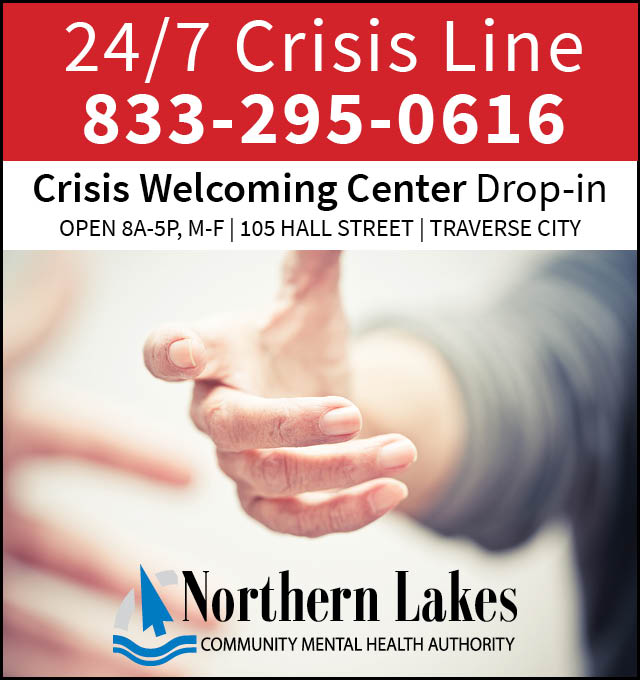
Back To School During COVID: Parents, Districts, Health Officials Grapple With Evolving Protocols
By Beth Milligan | Sept. 16, 2021
With Grand Traverse County students now having a full week of school under their belts, early trends are already emerging when it comes to COVID impacts and protocols. Most local school systems are already seeing confirmed positive cases in classrooms, but responses this year are significantly different than last year – with vaccinations in play and no state orders in place guiding masking and quarantining requirements. Local school and health leaders spoke with The Ticker about the challenges posed by those differences – notably confusion among families over which rules to follow – as well as plans for getting through the fall semester safely.
Traverse City Area Public Schools (TCAPS), which is requiring universal masking in schools, had 14 positive cases in the district as of Wednesday, including four at Westwoods Elementary School, three at East Middle School, two each at Central Grade and West Senior High, and one each at Central High, Eastern Elementary, and Traverse Heights. The district is posting both daily and year-to-date case numbers for every school on the TCAPS Safe Start Plan website. At Monday’s TCAPS board meeting, Superintendent Dr. John VanWagoner said TCAPS initially tried to assist the Grand Traverse County Health Department by notifying families of students who may have been exposed to COVID, a process TCAPS also assisted with last year. However, VanWagoner said staff shortages were making it impossible to keep up with both providing notifications and monitoring recommended quarantines. He suggested the district focus solely on enforcing isolations, or confirmed positive students and staff, to ensure those individuals didn’t enter school buildings until they were properly cleared.
“It’s the health department’s job to notify students and families if a student is in a quarantine situation or in isolation…I've insisted with the health department they are the leader in notifying any parents and making those recommendations and sending that information at this point,” he said. VanWagoner said matters were further complicated because the Grand Traverse County Health Department is only recommending and not enforcing quarantines for close contacts of positive cases. Enforcement is the health department's domain and not the district's, VanWagoner noted, ultimately leaving it up to families to decide whether to follow recommendations and keep a student home if they're a close contact of a positive case.
Grand Traverse County Health Department Health Officer Wendy Hirschenberger confirms to The Ticker that her department will handle all notifications of close contacts for TCAPS going forward. She says that recommending but not enforcing quarantines is similar to the position taken by other health departments throughout Michigan. “Last year it was one-size-fits-all, with a lot of state orders, so everything was consistent throughout the entire state,” she said. “At that point, we also didn’t have vaccines and other things that could reduce risk. It was very simple then: If you’re exposed, you quarantine for 14 days. Now we’re in a situation where we have options to mitigate risk, and we’re trying to find that balance between the impact of quarantine (on students) and the need to reduce viral transmission in schools.” Hirschenberger says that as the pandemic progresses and guidelines become more individualized to different risk groups, “it’s not a surprise” that parents and the public could find those rules confusing compared to when universal mandates were in place.
TCAPS, the largest school district in northwestern Michigan, is also challenged by the sheer number of students it oversees: more than 9,000. Leaders from smaller local school systems say they have more capacity to assist the health department with tasks like notifying families. Kingsley Area Schools Superintendent Dr. Keith Smith says his district, which is mask-optional and has had one confirmed positive case since school began, is in the best position to identify close contacts of students and help facilitate quick notification of families.
“As long as we have the capacity, we’ll do that and help free up resources for the health department to help other districts,” he says. As with TCAPS, Kingsley plans to enforce isolations but not quarantines at schools. “I don’t feel it’s appropriate to substitute my judgment for the health department’s,” Smith says, noting that many students could be exposed to COVID but never become sick or develop symptoms, making missing significant class time an unnecessary burden.
Superintendent Tyler Van Schepen of Traverse City Christian School says 2021 is “different from last year in how the guidance has been rolled out and communicated, which can be hard for schools and families regarding how to make decisions and stay on top of the guidance amidst the range of perspectives on the matter.” He says his school, which is mask-optional and has four confirmed positive cases, is working with the health department to identify and communicate with close contacts in the building. Both TC Christian School and Grand Traverse Area Catholic Schools say that as with other schools, they’re relying on the health department to provide quarantining instructions to families. GTACS Director of Marketing & Communications Cathy Nelson says the mask-optional district doesn’t yet have any positive cases, but will post them on an online dashboard when they do. “We will continue to notify our families of school-associated cases via email,” she says.
The Greenspire School experienced its first confirmed positive COVID case since the pandemic began at its new high school last week. “Luckily, due to our masking and social distancing protocols, no other students were required to miss any school,” says Superintendent Robert Walker. Walker says the health department “was super helpful to walk us through the process and clearly communicate anything that we needed to do as a result.”
Northwestern Michigan College, meanwhile, utilizes a COVID response team that works in conjunction with health officials to notify close contacts and communicate potential exposure sites to the college community. NMC has had seven confirmed positive cases since fall semester started August 28. The college requires unvaccinated people to quarantine for 10 days after close contact, while fully vaccinated people “should monitor for symptoms for 14 days and test 3-5 days after potential exposure,” according to NMC Associate Vice President of Public Relations, Marketing and Communications Diana Fairbanks.
How the rest of the fall semester will play out under the evolving protocols remains to be seen. While children represent 15.5 percent of total cumulated COVID-19 cases since the pandemic began in the U.S., they represented 28.9 percent of reported cases last week, according to the American Academy of Pediatrics (AAP). Over 243,000 cases were added the past week, the second highest number of child cases in a week since the pandemic began. However, while it’s uncertain how cases might impact children’s long-term health, there are also reasons for optimism: Available data indicates COVID-related severe illness, hospitalization, and death still remain “uncommon” among children, according to the AAP. COVID-19 vaccines for children between the ages of 5 and 11 could also be authorized this fall, a potential game-changer that could not only reduce school outbreaks but once again reshape district protocols.
“There’s a lot that could change within the next six weeks even,” says Hirschenberger. “It’s something we’ll continue to work closely with the schools on. Our goal is to keep kids in school as much as possible, as safely as possible.”
Comment






